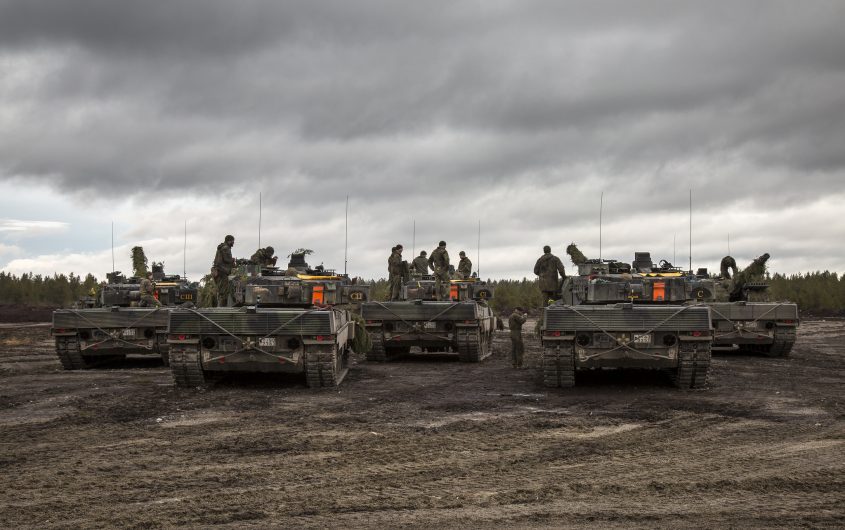
SGM Marco Dorow, German Army / NATO via Flickr
A Germany Alone?

Stephen F. Szabo
Senior Fellow
Dr. Stephen F. Szabo is a Senior Fellow at AICGS, where he focuses on German foreign and security policies and the new German role in Europe and beyond. Until June 1, he was the Executive Director of the Transatlantic Academy, a Washington, DC, based forum for research and dialogue between scholars, policy experts, and authors from both sides of the Atlantic. Prior to joining the German Marshall Fund in 2007, Dr. Szabo was Interim Dean and Associate Dean for Academic Affairs and taught European Studies at The Paul H. Nitze School of Advanced International Studies, Johns Hopkins University. He served as Professor of National Security Affairs at the National War College, National Defense University (1982-1990). He received his PhD in Political Science from Georgetown University and has been a fellow with the Alexander von Humboldt Stiftung, the Woodrow Wilson International Center for Scholars, and the American Academy in Berlin, as well as serving as Research Director at AICGS. In addition to SAIS, he has taught at the Hertie School of Governance, Georgetown University, George Washington University, and the University of Virginia. He has published widely on European and German politics and foreign policies, including. The Successor Generation: International Perspectives of Postwar Europeans, The Diplomacy of German Unification, Parting Ways: The Crisis in the German-American Relationship, and Germany, Russia and the Rise of Geo-Economics.
Those trying to hold the transatlantic relationship together now not only have to contend with the tweets and erratic policies emanating from the White House, but with the actions and inactions of a lame duck divided government in Berlin. The recent decision by the German government to back away from its pledge to increase defense spending to 1.5 percent of its GDP by 2025 is a blatant example of an increasingly parochial Germany. This back-tracking on an important policy decision was advanced by the Social Democratic vice chancellor and finance minister, Olaf Scholz, in order to control federal spending given the prospect of slower growth in the German economy. This action was taken despite the fact that Germany has run major budget surpluses in recent years and goes against the coalition agreement and numerous statements by top German leaders that Germany was taking its defense obligations seriously. To be fair, the chancellor points out that defense spending in 2020 will actually rise by 4.3 percent compared to 2019. The out-year defense projections in the Finance Plan, however, show spending at 1.25 percent of GDP in 2023, the same proportion as in 2018; Merkel has stated that these are minimum levels and could rise in the future. She also justified the Finance Plan cuts by stressing the contribution Germany is making to humanitarian and development assistance as part of a broader comprehensive definition of security, arguing that the German contribution is larger than it looks. However, this ignores the points made just recently by the SPD Commissioner for the Bundeswehr, Hans-Peter Bartels, in a scathing report on the operational state of the armed forces. These deficiencies in equipment were underscored by the embarrassing grounding of Bundeswehr flights with maintenance issues transporting the chancellor and the foreign minister to important meetings, forcing them to fly commercial.
This action was taken despite the fact that Germany has run major budget surpluses in recent years and goes against the coalition agreement and numerous statements by top German leaders that Germany was taking its defense obligations seriously.
Many who are otherwise critical of the Trump administration can agree with a statement by the American ambassador to Germany, Richard Grenell, who reacted to the cuts stating, “Reducing its already unacceptable commitments to military readiness is a worrisome signal to Germany’s 28 NATO allies.” Given his past interventions this was relatively mild, and yet his comment set off a furious reaction in Berlin. A leading Liberal party parliamentarian has even called for his expulsion. Yet Ambassador Grenell’s reaction is justified as it is directed at not just a domestic German decision, but at one which impacts its commitment to its NATO allies. Many members of the Bundestag probably agree with the substance of his critique.
While many in Germany associate increased defense spending with caving in to the Trump administration, the reality is that the German government is neglecting both its European partners and the members of its own military. There seems little regard in Berlin for its international commitment in a NATO context, or for the safety of those Germans who have volunteered to serve their country, exposing them to unacceptable risks from deficient equipment and training.
As Judy Dempsey of Carnegie Europe has just pointed out, this latest decision is part of a tendency in Berlin to talk the multilateral talk but not to walk the walk.
All of this reflects a Berlin that still does not have leaders serious about playing a strategic role and providing public goods in its own interest.
All of this reflects a Berlin that still does not have leaders serious about playing a strategic role and providing public goods in its own interest. Everyone in the small German strategic community both inside and outside of government have been going on about the changed strategic environment and the new dangers to the open liberal order but then opt to continue to rely on an unfriendly and unpredictable administration in Washington and to ignore their responsibilities for European security. The fact that the chancellor allowed her hand-picked successor, Annegret Kramp-Karrenbauer, to reply to French president Emmanuel Macron’s call for more European integration is clear evidence that the Merkel era is over. Chancellor Merkel has decided to make rousing speeches like the one at the recent Munich Security Conference while not following up with any substantive policies or exerting leadership in her own government.
The problem facing German Atlanticists in trying to make a case for a continued close transatlantic partnership against a skeptical public now also confronts their American counterparts. The upcoming NATO commemoration of the Alliance’s 70th anniversary looks to be a disaster in the making. The German government has now opened the door for a further assault on NATO from the Trump administration by providing Euroskeptics with new ammunition. While Germans are rightly concerned about the flip flops and unpredictability of the Trump administration, they have now damaged their own credibility as a reliable partner with this unilateral reversal.









